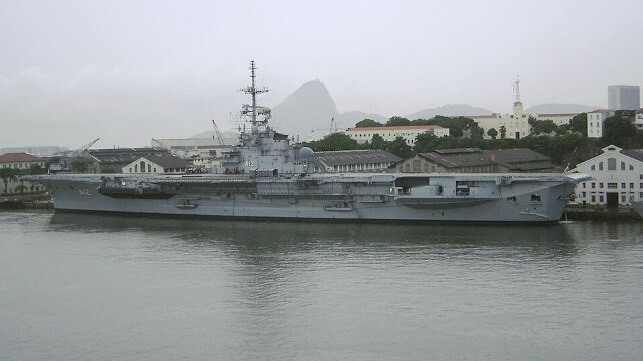Brazil's Proposal to Sink “Toxic” Carrier Raises Environmental Protest

Environmental groups are vocally protesting the suggestion that Brazil might sink its decommissioned aircraft carrier the NAe São Paulo as a solution to the fate of the hulk stranded offshore after Turkey refused the vessel for recycling and Brazilian ports refused to let the ship return to dock. The carrier built by the French in the late 1950s and operated by Brazil till it was decommissioned in 2018 has been stranded at sea for nearly six months with the Brazilian Navy contending the hull and structure are rapidly decaying.
The fate of the hulk rests with the Brazilian Navy after they reclaimed the ship from the Turkish scrappers. The vessel under tow had left Brazil in August but shortly after the departure, environmentalists began protesting the plan to dismantle the ship saying it still contained large amounts of asbestos and other toxins that were not properly accounted for in a survey of the vessel. Those concerns led Turkey to revoke its permits and the tow after reaching the entrance to the Mediterranean was turned around. Reaching Brazil by early October the vessel was ordered to remain offshore and the Brazilian courts said the Navy did not have the authority to force ports to accept the ship.
Speaking off the record, Navy officials are now suggesting a controlled sinking of the carrier might be the only remaining solution. They contend the structure of the vessel is rapidly decaying at sea. The Brazilian newspaper Folha de S. Paulo is citing a report that says additional structural cracks were identified in a January survey that had not been present in October.
The newspaper quotes the report to the Navy citing “a critical increase in the degradation of the hull can be seen.” The report cites an increase in the amount of water inside the vessel saying since August over 2,700 liters have entered the hull with a prediction that the limit for safe navigation is 3,500 liters. According to the newspaper, the number of compartments compromised by some type of flooding has increased from 10 to 23 making it impossible to save the hull. The report predicts in possibly four weeks’ time there could be “a loss of buoyancy or an irreversible loss of minimum stability for navigation.”
The environmental groups however are citing the “civil society coalition” expressing serious doubts that the ship is in danger of foundering and causing damage to the Brazilian coast, as claimed by the Navy. They said that no evidence has been produced or published on government websites that there is any concern with respect to the hull except for the need for minor repairs.
"Based on the evidence at hand, the Brazilian Navy should be condemned for gross negligence. If they proceed with dumping the very toxic vessel into the wilderness of the Atlantic Ocean, they will violate the terms of three international environmental treaties and do so for no good reason,” said Jim Puckett, Director of the Basel Action Network. “We call on President Lula as the commander-in-chief to immediately halt the dangerous sinking plan."
According to the NGOs, the Navy breached Basel rules by refusing to allow the vessel to safely dock in Brazil. With the move to sink the ship into the ocean, they assert that Brazil is set to violate the Convention on the Prevention of Marine Pollution by Dumping of Wastes and Other Matter’s London Protocol 1996, as well as the Stockholm Convention on Persistent Organic Pollutants (POPs).
In addition to the repeated contentions that the vessel still has large amounts of asbestos aboard, the NGOs citing the vessel’s sister ship the Clemenceau, said they believe the Brazilian ship also contains more than 300 metric tons of PCB-laden materials such as the wiring and gaskets. While the Brazilian Navy contends large amounts of asbestos were removed during earlier refits, the environmentalists respond by saying there has been no record of removal of the wiring or gaskets on board the NAe São Paulo since the carrier was decommissioned.

that matters most
Get the latest maritime news delivered to your inbox daily.
Members of the newly elected civilian government are reported to be expressing concerns over the idea of a controlled sinking. However, they lack authority over the military meaning the Navy will decide the fate of the carrier.
Top photo NAe São Paulo docked in Rio de Janeiro in 2008 by Eric Gaba (CC BY SA 3.0)
